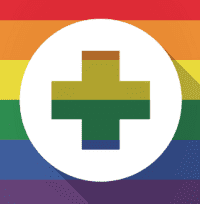PCDC Hosts ‘Culturally Responsive Health Care for LGBTQ Communities’ Webinar Series


PCDC led a free webinar series this month to help health care staff incorporate cultural responsiveness when working with LGBTQ communities.
The three-part series is novel for its comprehensive “virtual” approach, with live interactive panel presentations on practical strategies for more inclusive care.
The webinars — “Culturally Responsive Health Care for LGBTQ Communities,” “Collecting Sexual Orientation and Gender Identity Data (SO/GI),” and “Talking About Sexual Health” — are now available for viewing following a brief one-time registration. Topics include:
 The webinars are led by PCDC’s Capacity Building Assistance (CBA) program, High Impact Prevention (HIP) in Health Care, funded by the Centers for Disease Control and Prevention (CDC).
The webinars are led by PCDC’s Capacity Building Assistance (CBA) program, High Impact Prevention (HIP) in Health Care, funded by the Centers for Disease Control and Prevention (CDC).
HIP in Health Care provides free training and technical assistance to health care organizations with the goal of expanding and improving the delivery of HIV prevention services within clinical settings.
“For the first time since the onset of the HIV epidemic, an end is in sight,” said Sarah Blust (pictured), Program Director of HIP in Health Care. “Culturally responsive health care — patient-centered care that considers social and cultural factors — is an important element in preventing and treating HIV, and reducing health disparities within LGBTQ communities. PCDC is proud to support the needs of health care organizations making this progress possible.”
To date, the series has drawn more than 400 professionals from a variety of fields — medicine, social work, and patient navigation among them — involved in preventing, diagnosing, or treating patients living with HIV/AIDS.
Among those featured on recent webinars were CrescentCare, a community health center in New Orleans (and a 2017 PCDC Champion), and El Rio Community Health Center, a health center in Tucson, Arizona. Both offered inspiring approaches on implementing patient-centered principles and providing more inclusive care, including collecting sexual orientation and gender identity data.
The subject matter is timely: The National HIV/AIDS Strategy calls for a highly coordinated approach to addressing each step along the HIV care continuum — testing and diagnosis, linkage to care, retention in care, treatment with anti-retroviral therapy, and achievement of viral suppression.
A key component of effective HIV prevention is to provide clinically and culturally competent services to communities most impacted by HIV. Gay, bisexual, and other men who have sex with men (MSM) account for 70% of new HIV infections in the United States. Transgender women in the United States are also at high risk for HIV.
“We hope that by providing health care staff with effective strategies for providing inclusive care for LGBTQ patients, we can increase access to these life-saving tools for the patients who need them the most,” Blust said.
[Each webinar — “Culturally Responsive Health Care for LGBTQ Communities,” “Collecting Sexual Orientation and Gender Identity Data (SO/GI),” and “Talking About Sexual Health” — and follows a brief one-time registration page.]
____________________________________________________________________________________________________
About HIV Prevention Capacity-Building Assistance
PCDC’s High-Impact Prevention (HIP) in Health Care program is funded by the CDC to build the capacity of health care organizations to deliver HIV prevention services and strategies within clinical settings. HIP in Health Care provides training and technical assistance at no cost to health care organizations (direct service providers) across the United States and its affiliated territories.